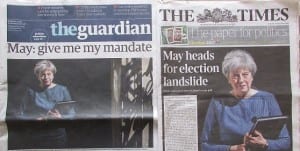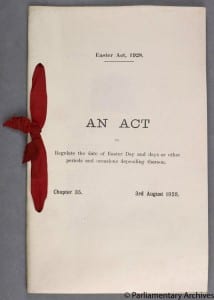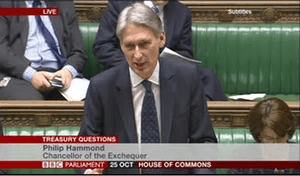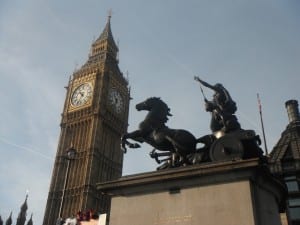This post first appeared on the LSE Policy and Politics blog on 18th April 2017.
 The Prime Minister has announced her intention to seek Parliament’s approval for a general election on 8th June. The Prime Minister’s surprise statement was long on bold intent and short on logical explanation. There are clear political benefits for the Conservatives in holding an election at this time. Labour are languishing in the polls and the government has a small majority, which may well be eroded over time by divisions in the Conservative Party or the outcome of ongoing investigations into MPs’ campaign expenses at the last general election.
The Prime Minister has announced her intention to seek Parliament’s approval for a general election on 8th June. The Prime Minister’s surprise statement was long on bold intent and short on logical explanation. There are clear political benefits for the Conservatives in holding an election at this time. Labour are languishing in the polls and the government has a small majority, which may well be eroded over time by divisions in the Conservative Party or the outcome of ongoing investigations into MPs’ campaign expenses at the last general election.
However, what is good for the Conservative Party is not necessarily what is good for the country, and there are a number of reasons why a general election at this time is a bad idea:
- It is simply not necessary. The Prime Minister somewhat petulantly asserted that ‘we need a general election and we need one now’ because she claims the political divisions at Westminster are jeopardising the Brexit negotiations. Leaving aside the bizarre complaint that opposition parties at Westminster are involved in opposing the government, this assertion more than any other in the Prime Minister’s statement, is hard to reconcile with reality. A little over a month ago the Prime Minister secured parliamentary approval for triggering article 50 with an overwhelming majority in the House of Commons. While the country remains divided on the question of Britain’s membership of the EU, what is striking about events at Westminster is the manner in which MPs from both sides of the chamber have been willing to line up behind the government on this issue. This is despite the fact that prior to the referendum, with the exception of the DUP, the majority of MPs from all parties who declared their position were in favour of remaining in the EU. If as the Prime Minister asserted in her Easter message that there has been a ‘coming together’ behind Brexit this has taken place at Westminster, not however, in the country.
- A general election will not alter the reality of the referendum result. Britain remains fundamentally divided on the question of EU membership and a general election will not alter that fact. In last year’s referendum 17.4 million people voted to leave the EU and 16.1 million voted to remain in. Opinion polls since the referendum indicate very little change in public opinion on this question. The Prime Minister’s recent statements suggests that this is something about which she is in denial. A general election will not enhance the Prime Minister’s mandate for leaving the EU, last year’s referendum did that, and the Prime Minister cannot hope to secure the support of 52% of voters in a general election, and the government’s mandate for the more complicated issue of negotiating a settlement will always be less clear than that provided by a simple in/out referendum. A general election will almost certainly change the parliamentary arithmetic but it is very hard to see how it will unite the country on a question on which it remains so fundamentally divided.
- It is unlikely to change the fundamental divisions across the UK and may accelerate the break-up of the Union. Another factor about which the Prime Minister appears to be in denial is that the majority of people in two of the four nations which make up the UK, voted to remain in the EU. A general election will do nothing to change this fact, and may reinforce the arguments of those who would like to break-up the Union. If the polls are to be believed, and we have little else to go on, Labour will lose seats to the Conservatives in England, but there will be little change in Scotland. Even if the SNP lose some seats, it seems highly unlikely that they will not hold a majority of Scottish seats at Westminster. The Prime Minister has been dismissive of SNP demands for a second independence referendum. However, if the SNP retain a majority of seats in Scotland on a general election which they will surely fight on the question of a second independence referendum, the SNP’s case will be significantly strengthened. The Prime Minister may calculate that a general election at this time will significantly enhance the fortunes of the Conservative Party in England, but if the price of that is the break-up of the United Kingdom, it is an extraordinary gamble.
- Finally, and most importantly, this is a significant and worrying distraction from the pressing issue of negotiating Britain’s withdrawal from the EU. It is less than three weeks since the Prime Minister triggered article 50 and set the clock ticking on Britain’s exit from the EU. This is arguably the most significant and challenging negotiation any UK government has faced in recent times. Most informed observers concede that it will be extremely difficult to complete negotiations within the two-year time frame offered by article 50, and that leaving without a negotiated settlement would be undesirable. Yet the Prime Minister thinks now would be a good time to set this aside and focus instead on a general election campaign. Even if the Conservatives retain or enhance their majority, time will be lost – a manifesto will need to be drafted, Ministers, including the PM, will need to spend time campaigning, and a new government will need to be formed. Whoever is in government when the UK leaves the EU in March 2019, may well rue the time wasted now. The inevitable churn caused by a general election will also undermine parliamentary scrutiny of the Brexit process. Parliament is currently deeply involved in scrutinising Brexit. A large number of select committees are conducting inquiries into some aspect of the implications of Brexit, a select committee for exiting the European Union has only recently begun its work. This will all come to a halt, inquiries will be quickly wound up or suspended, and new select committees will need to be appointed after the election. It is hard to see how this will enhance parliamentary scrutiny of the Brexit process.
There are clear potential benefits for the Conservative Party in holding a general election now, but it is very hard to see how this is in the national interest. If the Prime Minister genuinely aspires to give the British people a say, then proper parliamentary scrutiny of the Brexit process and ultimately a parliamentary vote, even a second referendum once the real costs of withdrawal are known, would be preferable to an opportunist election now.



